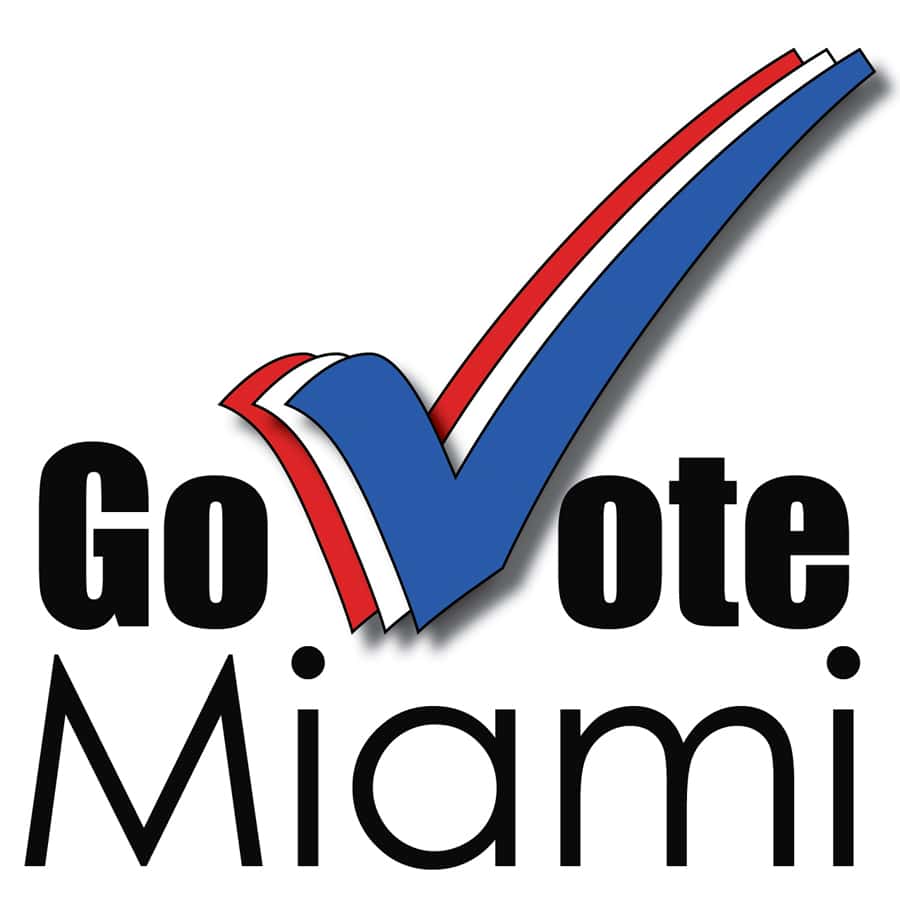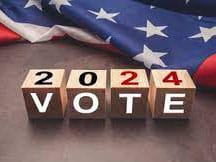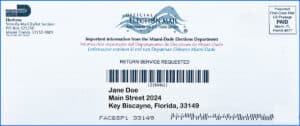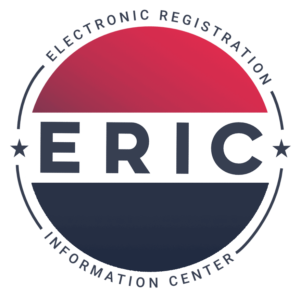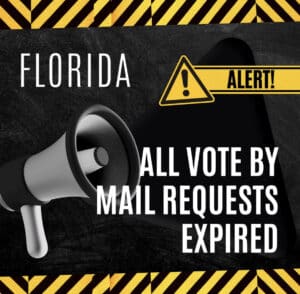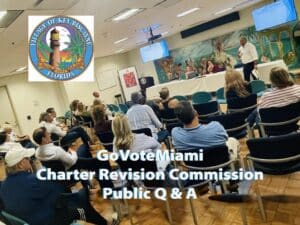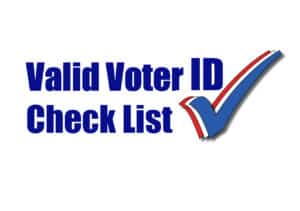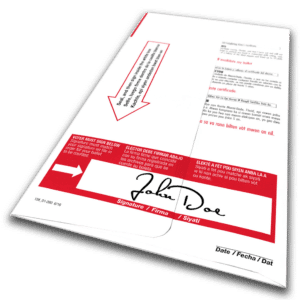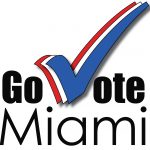Elections
Everything you need to know about Election Day, Early Voting Locations, finding your precinct, acceptable forms of ID, provisional ballots, VBM Dropoffs, voting with a disability and more.
Elections | Time to Vote
Voting locations are open from 7 a.m. to 7 p.m. Election Day.
Before any election it is important to confirm that you have a valid voter ID. Equally important is to know what form of ID is considered a valid voter ID. When voting in person, whether at an early voting site or at a polling place on Election Day, photo identification is required. Voters must bring a current and valid identification that contains their name, photograph, and signature.
If you do not have a photo ID with your signature, you can combine a PHOTO ID and a SIGNATURE ID from this list below.
Acceptable forms of identification include
- Florida driver license.
- Florida identification card issued by the DMV.
- United States passport.
- Debit or credit card.
- Military identification.
- Student identification.
- Retirement center identification.
- Neighborhood association identification.
- Public assistance identification.
- Veteran health identification card issued by the U.S. Department of Veterans Affairs.
- A license to carry a concealed weapon or firearm issued pursuant to § 790.06 F.S.
- Employee identification card issued by any branch, department, agency, or entity of the Federal Government, the state, a county, or a municipality.
While it is not required that voters bring their voter information card to the polling place on Election Day, it will expedite the check-in process since a poll worker can quickly find you in the voter database via your voter registration number.
Complete video guide on how to vote by mail from start to finish:
28 Early Voting Locations
October 24 – November 6 from 7am – 7pm
Frequently Asked Questions
FAQ - Vote By Mail
Absolutely Nothing. In Florida, the term “absentee ballot” was replaced by “vote-by-mail ballot” in the state statutes in 2016, since Florida voters do not need any excuse (such as absence) to vote by mail.
You must SIGN the OUTSIDE of the VBM envelope where indicated! Failure to do so will result in your vote not being counted.
Fill in the ballot with BLACK or BLUE INK only. No pencil or other colors.
Vote By Mail eliminates the need to wait in long, hot lines. VBM is convenient and it results in a much higher rate of voter participation. When more voters vote, we all win.
You have the following options to return your completed VBM ballot:
- Checking first to make sure you have signed the outside of the envelope where indicated, you may MAIL your ballot to the Elections Department. Your ballot must be received by the Department of Elections by 7pm on Election Day. Take into consideration the possibility that a high volume might slow down the Postal Service.
- Drop off your VBM Ballot at any Early Vote Location. Early Vote Locations will have Drop Boxes that are monitored by Department of Elections personnel.
- Hand in your VBM ballot on Election Day, at your precinct’s Voting Location. Polls are open from 7AM to 7PM.
- Drop off your VBM ballot in person at the Election Department on 2700 NW 87 Avenue, Miami, FL 33172.
- Have a DESIGNEE drop off your ballot for you. Follow the steps outlined by the Department of Elections here. Scroll down to where it says, “Request or Return Ballot by Designee,” and click for information.
SUGGESTION: To help the Elections Department to contact you in case of a signature discrepancy, list a phone number or email address on the outside of the VBM envelope.
The Election Department Staff is available to answer your questions. Contact them by phone at 305-499-VOTE (8683) or by email: VoteByMail@MiamiDade.gov or find more answers at MiamiDade.gov
Yes. Voters must request their VBM ballot no later than 5PM 10 days before any election.
No. Requesting a VBM ballot does not require you to vote by mail, it makes it possible for you to vote by mail – OR in person. Your options are: Mail your VBM ballot. Drop your VBM ballot off at a voting location (any early voting location in Miami Dade County -or- at your precinct on election day). Or vote in person.
If you have received a VBM ballot, but decide to vote in person, you can vote at any early voting location, or on Election Day at your precinct polling location. It is not necessary to bring the VBM ballot, BUT it is HIGHLY RECOMMENDED to avoid any challenges.
Voters have several options to return their vote-by-mail ballots:
- Return your ballot by mail with plenty of time to arrive at the Election Department. Budget 4-5 days to be safe (weekends not included). Some voters use registered mail to confirm when their ballot was received. It is the voter’s responsibility to ensure the ballot is received by 7PM on Election Day.
If you do not want to mail your ballot,
- Hand in your VBM ballot in person at any early voting location in Miami-Dade County. Early voting starts August 3rd and ends August 16th.
- Hand in your VBM ballot on Election Day, at your precinct’s Voting Location. Polls are open from 7AM to 7PM.
- You can also drop off your VBM ballot in person at the Election Department on 2700 NW 87 Avenue, Miami, FL 33172.
- You can have a DESGINEE drop off your ballot for you. Follow the steps outlined by the Department of Elections.
All VBM ballots must be received by 7PM on Election Day in order to be legitimate and be counted.
Yes. The Miami-Dade Department of Elections has implemented many safety measures to ensure the integrity of vote-by-mail voting. Voters can even TRACK THEIR BALLOT on line.
Please view the INFO VIDEO below by the Miami-Dade Department of Elections. If you have additional questions, call the Elections Department 305.499.VOTE (8683).
There are several good reasons why voting by mail is a good idea.
- You receive your ballot approximately 3-4 weeks prior to Election Day. This gives you time to review the ballot, ask questions, inform yourself about candidates, judges and other positions – as well as ballot measures. You can make these decisions in the comfort of your home – and with plenty of time to make an informed choice.
- In case of illness, the fear of infection (COVID-19) or an unexpected absence (travel) – you have the option to mail in your ballot.
- Voter turnout goes up by about 12-28% (depending on the voter’s demographic) when a vote-by-mail ballot is requested. That means approximately one quarter more voters participate in the democratic process of selecting their representatives.
- It’s a safe, comfortable and convenient way to vote.
Once the Department of Elections receives your ballot and finds a problem – you will be notified of the problem and offered an opportunity to “CURE YOUR BALLOT”. The most common issue is that the SIGNATURE on your envelope does not match the Election Department’s records. To correct your signature,
- fill out THIS FORM, and return it to the Department of Elections NO LATER THAN by 5PM the 2nd Day after the Election.
- You can drop off the form in person at 2700 NW 87 Avenue, Miami, FL 33172, email it to vbmaffidavits@miamidade.gov or fax it to 305-275-7760.
- Questions? Call the Dept. of Elections 305.499.VOTE(8683)
We recommend to take a photo of your form before surrendering it.
In general the application for a vote by mail ballot is valid through the calendar year of two general elections and must then be renewed. It is recommended to check your VBM status before every election.
Every voter is eligible to vote by mail. That includes
- Students who attend university outside Florida.
- Homeless persons (they can use the address of a shelter; no churches)
Persons who are currently in jail but have not yet been convicted of a felony.
As soon as the Dept. of Elections receives voters’ ballots, counting and signature verification begins. Votes are tabulated as ballots arrive. All VBM ballots will be counted, even after polling stations close.
IMPORTANT: If the number of not-yet-counted ballots could affect the outcome of a race, the election will NOT BE CALLED ON ELECTION NIGHT.
Yes! All votes, in person or VBM votes, will be entered into the Elections Department’s system and data base. You can track your ballot here and follow it through all the steps of the process.
SUGGESTION: to help the Elections Department to contact you in case of a signature discrepancy, list a phone number or email address on the outside of the VBM envelope. You do not have to list your name.
All votes, in person or VBM votes, will be entered into the Elections Department’s system and data base (you can track your ballot here).
That you voted and how you voted, is public record; the record will show if you have voted in person, voted early or voted by mail. It does NOT show what candidates you have voted for. You can make a public record request to see the history of your voting record.
SUGGESTION: to help the Elections Department to contact you in case of a signature discrepancy, list a phone number or email address on the outside of the VBM envelope. You do not have to list your name.
If your vote by mail ballot was lost or misplaced, you can make a vbm ballot replacement request by submitting the Replacement Mail Ballot Oath via THIS FORM. The Election Department must receive it no later than 7PM on Election Day. You can submit it by mail, or in person. If you want your replacement VBM ballot mailed to you, that request has to be made by 5PM 10 days prior to any election.
No! The Election Department checks that only ballots from voters with a VBM ballot request on record are counted. If you have not requested to vote by mail, but use someone else’s ballot, it will be considered invalid and NOT BE COUNTED. Tampering with another voter’s mail ballot is punishable by law.
The number of “uncounted ballots” is public record and very low. In Miami-Dade that number ranges from 1.56 to 2.5% of all submitted VBM ballots. Every vote should be counted – and the Election Department is making great efforts for that to happen. Voters can contribute to that success by carefully following the guidelines on the ballot.
Around 50% of all uncounted ballots in 2016 and 2018, were invalid because voters did not sign the ballot envelopes – and did not respond to the ballot cure request. The remaining uncounted ballots included voters who have moved out of the county, died, used someone else’s ballot or filled out the ballot incorrectly.
Frequently Asked Questions
FAQ - What if Something Goes Wrong?
A voter can be challenged for a number of reasons.
If you are challenged at the polls, you still have the right to vote a provisional ballot.
If you are challenged because of your address, you may still be able to vote a regular ballot if your new address corresponds to the same precinct. If your new address falls within another precinct, the poll worker will direct you to the proper precinct. Contact your supervisor of elections for further questions. Contact information is here.
Yes, you will be allowed to vote a provisional ballot. See our section on provisional voting
YES! If you are already in line when the polls close, you have every right to cast your ballot. At 7pm, a poll worker will go to the end of the existing line, indicating with a sign that no additional voters may join, but all who were already in line will have the opportunity to vote.
Provisions exist in law, including not limited to, for felony offenses for deprivation of or interference with voting (Section 104.0515, Fla. Stat.), intimidation and suppression (Section 104.0615, Fla. Stat.), influencing or interfering with voting (Section 104.061, Fla. Stat.), threatening to control votes of employees (Section 104.081, Fla. Stat.). Contact immediately your local law enforcement, Supervisor of Elections’ office, and/or the Division of Elections (and file an election fraud complaint).
Miami-Dade County (along with 14 other counties in Florida) specifically subject to Spanish language requirements under Section 203 of the Voting Rights Act. (52 U.S.C. § 10503) and U.S. Census Bureau determination. They must provide oral and written assistance and election-related materials such as instructions, forms, ballots and notices.
Frequently Asked Questions
FAQ - Provisional Ballots
A voter can be challenged for a number of reasons.
If you are challenged at the polls, you still have the right to vote a provisional ballot.
If you are challenged because of your address, you may still be able to vote a regular ballot if your new address corresponds to the same precinct. If your new address falls within another precinct, the poll worker will direct you to the proper precinct. Contact your supervisor of elections for further questions. Contact information is here.
Provisional ballots are intended to provide fail-safe protection for voters when there are questions about their registration status on Election Day.
Per Florida Statute 101.048, at all elections, a voter claiming to be properly registered in the state and eligible to vote at the precinct in the election but whose eligibility cannot be determined, a person whom an election official asserts is not eligible and other persons specified in the code shall be entitled to vote a provisional ballot.
In its most basic form, a provisional ballot works like this: A voter whose name doesn’t appear on the voter registration list at a precinct polling place on Election Day—but who believes she or he is, in fact, registered—may be offered a provisional ballot. After being marked, it’s placed in a special secrecy envelope rather than in the ballot box. After the polls close, the registration status of the voter is determined. If the voter was in fact registered on Election Day, the ballot is removed from the secrecy envelope and counted just like any other ballot. If the voter wasn’t registered, the ballot remains in the secrecy envelope and is not counted.
All provisional ballots remain sealed in their envelopes for return to the Supervisor of Elections office.
A person casting a provisional ballot shall have the right to present written evidence supporting their eligibility to vote to the Supervisor of Elections by no later than 5 p.m. on the second day following the election.
If it is determined that the person was registered and entitled to vote at the precinct where the person cast a vote in the election, the Canvassing Board must compare the signature on the Provisional Ballot Voter’s Certificate and Affirmation or the provisional ballot cure affidavit with the signature on the voter’s registration or precinct register.
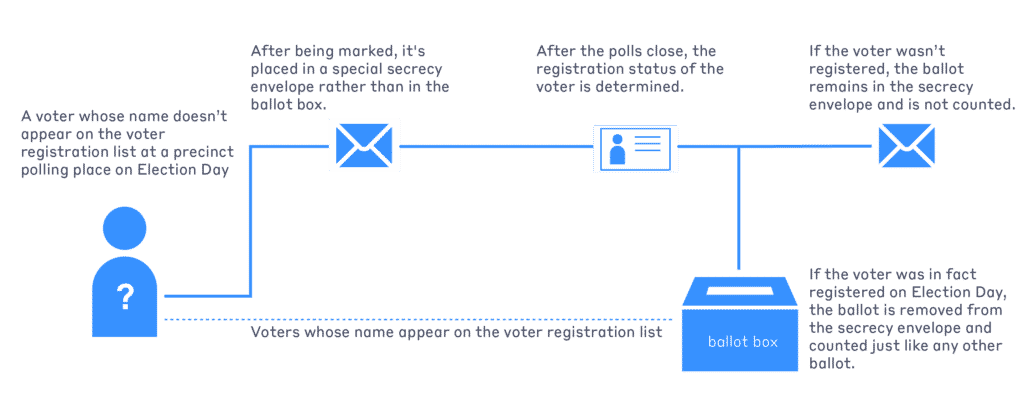
A Provisional Ballot may be issued for one of the following reasons:
- Voter’s name does not appear on the precinct register and voter’s eligibility is unverified
- Voter refutes the Supervisor of Elections office confirmation that they are not registered or eligible
- There is an indication on the precinct register that the voter has requested a vote by mail ballot and the voter does not have a ballot to submit. Poll worker is unable to verify that the voter has not voted.
- There is an indication on the precinct register that the voter has returned the vote by mail ballot or has voted in the office or at an early site, but the voter maintains that they have not voted, even after a call to the Supervisor of Elections office (Elections Central).
- Voter did not provide picture/signature identification
- There is an indication on the precinct register that the voter has been challenged in this election
- Voter is challenged at the precinct
- Voter’s signature does not match signature on record and affidavit refused
- Indication on precinct register that the voter’s Florida Driver’s License, Florida identification card number or Social Security number is not yet verified by the Department of State in conjunction with Department of Highway Safety and Motor Vehicles
When you vote provisionally, you will be given a written notice of rights. You have up until 5 PM (local time) on the second day after the election to present further evidence of your eligibility. (See section 101.048, F.S.)
If you voted a provisional ballot solely because you did not have an acceptable photo and signature identification, you do not need to provide further evidence of your eligibility in order for your ballot to count, provided you are otherwise eligible and qualified to vote.
The local canvassing board will compare your signature on the provisional ballot certificate with the signature in your voter registration record. If the signatures match, your provisional ballot will be counted, provided you are otherwise eligible. If your signature is missing from the ballot certificate or does not match, the Supervisor of Elections’ office will attempt to contact you, as soon as practicable with the available contact information in your records, so you can cure the defect. You will need to submit to the Supervisor of Elections a completed DS-DE 210 – Provisional Ballot Cure Affidavit (English PDF /Español PDF) no later than 5 PM (local time) with requisite identification on the second day after the election.
A provisional ballot may be counted only if:
The signature on the voter’s certificate or the cure affidavit matches the elector’s signature in the registration books or the precinct register; however, in the case of a cure affidavit the supporting identification listed below must also confirm the identity of the elector
Or
The cure affidavit contains a signature that does not match the elector’s signature in the registration books or the precinct register, but the elector has submitted a current and valid Tier 1 form of identification confirming his or her identity.
- Tier 1: Identification – Current and valid identification that includes your name and photograph: Florida driver license; Florida ID card issued by the Department of Highway Safety and Motor Vehicles; United States passport; debit or credit card; or military, student, retirement center, neighborhood association, or public assistance ID; Veteran health identification card issued by the United States Department of Veterans Affairs; Florida license to carry a concealed weapon or firearm; or employee identification card issued by any branch, department, agency, or entity of the Federal Government, the state, a county, or a municipality.
If you do not have a Tier 1 form of identification, you may provide one of the following:
- Tier 2: Identification – ID that shows your name and current residence address: current utility bill; bank statement; government check; paycheck; or government document (excluding voter information card).
Any provisional ballot not counted must remain in the envelope containing the Provisional Ballot Voter’s Certificate and Affirmation and the envelope shall be marked “Rejected as Illegal.”
Your Notice of Rights will include instructions on how to find out if your provisional ballot was counted, and if not, the reason(s) why. You should be able to get this information no later than 30 days following the election. (Sections 101.048, Fla. Stat.) Contact information is here.
If you forgot to sign or the signature on the provisional ballot envelope does not match the signature on record, Florida law allows you the opportunity to submit an affidavit to cure your provisional ballot. The Provisional Ballot Cure Affidavit must be completed and submitted to the Elections Department along with a copy of your identification by 5.p.m. on the second day after the election.
Provisional Ballot Affidavit (English)
Provisional Ballot Affidavit (Spanish)
Provisional Ballot Affidavit (Creole)
Yes, you will be allowed to vote a provisional ballot.
Frequently Asked Questions
FAQ - Judicial Races
Judges make decisions on a wide range of issues large and small including traffic, small claims, landlord-tenant, personal injury, criminal, death penalty, probate, guardianship and others.
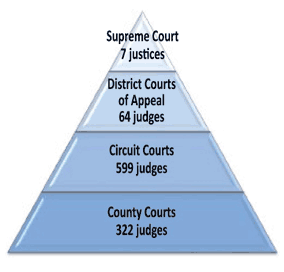
- County Judges hear criminal misdemeanors – those are crimes that have possible sentences of up to one year in jail. They also hear civil cases in which the amount in dispute is $ 30,000 or less.
- Circuit Judges deal with criminal felonies, domestic relations, juvenile matters, probate issues and civil cases in which the disputed amount is greater than $30,000. In Miami-Dade (11th Circuit) there are 20 judges in the Civil Division, 18 judges in the Criminal Division and 9 judges in the Domestic Violence Division.
- Appellate Judges (on the five District Courts of Appeal) and the Florida Supreme Court review the decisions of county and circuit judges.
In nonpartisan elections, candidates appear on the ballot without a reference to any political party (e.g. Democrat or Republican). Florida law requires judicial elections to be nonpartisan in order to preserve the impartiality of the judge’s decision. That applies to County, Circuit, Appeals and Surpreme Court Judges
No. These judges were appointed by the governor. When they appear on the ballot voters decide if they should be retained, or not. A “YES” vote means you want the judge to remain on the court. A “NO” vote means you want the judge removed. The majority of voters decides.
Yes. Both run against opponents if there is more than one candidate for the same position. Voters have to choose one of the candidates.
No. Currently, County and Circuit Judges are elected to 6 year terms. Only if a judge retires, resigns or dies before the end of the term, the governor appoints a judge to fill the position.
The 7 judges on the Florida Supreme Court and the judges of the 5 District Court of Appeals are appointed by the governor – and then run in merit retention elections where voters decide if they should stay in office.
Judicial candidates are prohibited from making predictions and promises about issues that could arise once they are on the court because their job is to make impartial decisions that relate to the law on the case before them.
No. Judges have no limits on the number of times they may be elected. However, judges may not service in Florida past the age of 75 (except upon temporary assignment).
Circuit and County Judges are elected for six-year terms.
To retain their seats, they must be re-elected. Judges who were appointed to County or Circuit Court through a vacancy must sit for election at the end of the remainder of the appointed terms. Appellate Judges, appointed by the governor, run in merit retention elections for six-year terms.
Florida requires that judges be elected (County/Circuit Courts) or retained (Appellate/Supreme Court) by the voters, so the power over who holds these important positions rests with the voters.
Judges make decisions on a wide range of issues large and small including traffic, small claims, landlord-tenant, personal injury, criminal, death penalty, probate, guardianship and others.
Yes. This can happen after an investigation by the Judicial Qualifications Commission. The JQC (www.Floridajqc.com) is an independent agency created through the Florida Constitution to investigate alleged misconduct by Florida state judges.
There are several sources for that information.
- Florida Bar Association Guide for Voters: https://www.floridabar.org/public/faircts/votes010/votes002/
- Florida Supreme Court Website: https://www.floridasupremecourt.org/
- Appellate Courts: https://www.3dca.flcourts.org/
- Circuit Courts: https://www.flcourts.org/Florida-Courts/Trial-Courts-Circuit
- County Courts: https://www.flcourts.org/Florida-Courts/Trial-Courts-County
- Florida Division of Elections – Searchable Database: dos.myflorida.com/elections
Subscribe
Subscribe to our newsletter to stay informed on the latest voting news & laws and never miss another deadline.
